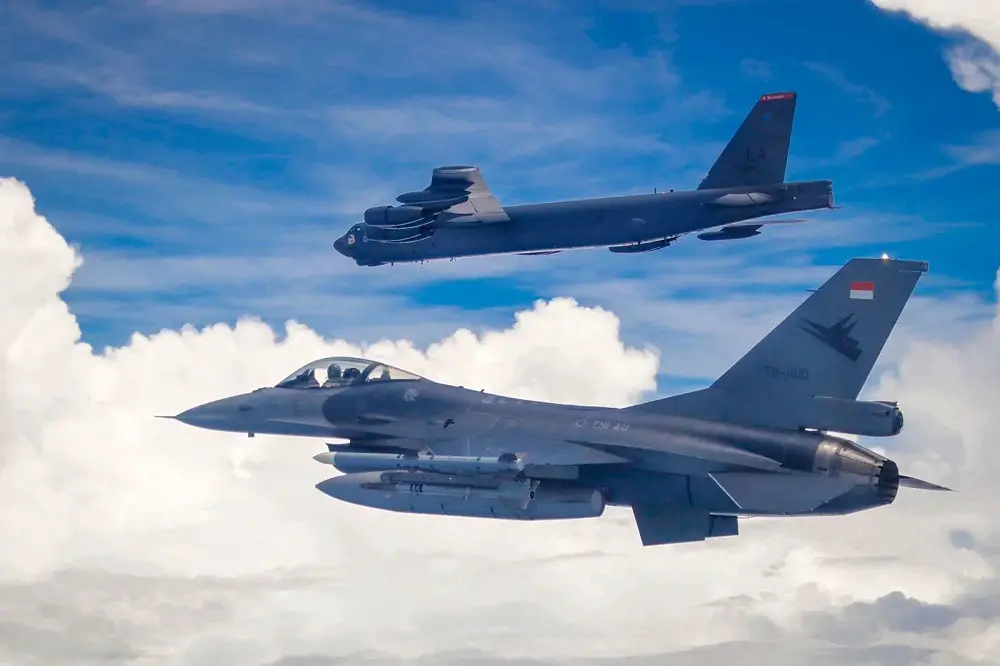Two B-52 Stratofortress bombers from the U.S. Air Force made a historic arrival in Indonesia, marking the first deployment of these aircraft to the country. The Indonesian Air Force confirmed that the two B-52s safely landed at the airport, having departed from Andersen Air Force Base in Guam. The Indonesian Air Force warmly received the bombers, accompanied by three Indonesian F-16s stationed at Roesmin Nurjadin Air Force Base in Pekanbaru. There are indications that the B-52s might participate in Exercise Cope West 2023, a bilateral training exercise presently taking place at Roesmin Nurjadin AFB, involving both the U.S. Air Force and Indonesian Air Force. Cope West 2023 commenced on June 12 and is scheduled to conclude on June 23. The exercise involves approximately 100 U.S. service members and six U.S. Air Force F-16s, alongside seven Indonesian Air Force aircraft.
Although specific details about the deployment are currently limited, the arrival of the B-52s in Indonesia reflects the United States’ ongoing efforts to strengthen partnerships in the Indo-Pacific region, particularly in light of concerns surrounding potential conflicts involving China. While the recent deployment of B-52s to Indonesia is a significant milestone for both countries and the U.S. Air Force, it is worth noting that B-52s have previously trained alongside Indonesian Air Force aircraft. In September 2021, the first Bomber Task Force (BTF) mission involving the Indonesian Air Force took place. During this mission, four Indonesian Air Force F-16s based at Iswahyudi Air Force Base in East Java joined forces with two B-52s from Barksdale Air Force Base in Louisiana, conducting operations over the Sulawesi Sea. This mission also marked the first time a B-52 integrated with the Indonesian Air Force during flight, as reported by Pacific Air Forces.

The B-52s currently deployed to Guam from Minot Air Force Base are part of a Bomber Task Force rotation in the Indo-Pacific. On June 12 and 14, four B-52s and over 200 airmen from the 23rd Bomb Squadron at Minot AFB arrived in Guam as part of this deployment. BTF rotations involve the deployment of Air Force bombers to various locations worldwide, including Guam, typically lasting a month or longer. These rotations aim to showcase the Air Force’s high state of readiness, validate its strike capability, and align with the concepts of Agile Combat Employment (ACE). Importantly, they establish a robust forward presence, often carrying out missions that approach the borders of potential adversary nations in the region.
The Boeing B-52 Stratofortress is an American strategic bomber known for its long-range, subsonic capabilities powered by jet engines. Designed and built by Boeing, the B-52 has been in operation with the United States Air Force (USAF) since the 1950s, with ongoing support and upgrades provided by the manufacturer. The bomber can carry an impressive payload of up to 70,000 pounds (32,000 kg) and has a typical combat range of approximately 8,800 miles (14,200 km) without requiring aerial refueling. Despite the introduction of more advanced strategic bombers, the B-52’s superior performance at high subsonic speeds and cost-effectiveness have contributed to its continued service. The B-52 celebrated 60 years of continuous service with its original operator in 2015, and following upgrades between 2013 and 2015, these aircraft are expected to remain in service until the 2050s.












